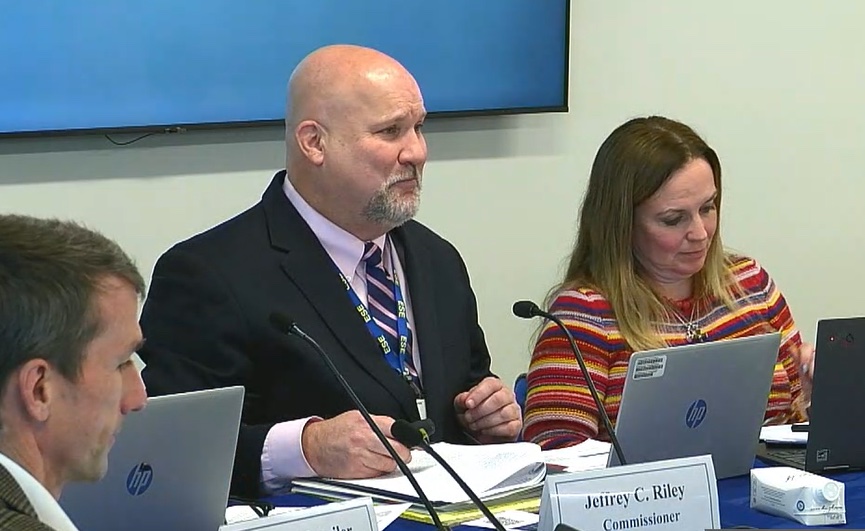latest
Massachusetts Ed Board Rejects Change Targeting Chronic Absenteeism

By Sam Drysdale
Despite about one-fifth of Massachusetts students being deemed “chronically absent” from schools, the state board of education rejected a proposal on Monday to give more weight to how many students were missing school in accountability measures, citing concerns about giving out sticks instead of carrots.
Elementary and Secondary Education Commissioner Jeff Riley announced in October that chronic absenteeism in Massachusetts public schools grew by 72 percent between 2019 and 2023, and called for an “all hands on deck” approach to address the issue.
Attendance improved over the past year, but in the Bay State — as in most states around the country — students are still missing far more school than they used to.
A student is deemed chronically absent if they miss 10 percent of school days, or 18 days by the end of the 180-day calendar.
“We were one of the most improved states in the country last year on chronic absenteeism, but still, even with that, 22 percent of our kids — almost a quarter of our kids — were missing more than 18 days of school,” Riley said at the board meeting on Monday, adding that 75 percent of schools in the state have an issue with students missing too many days.
As of Jan. 8, the percentage of students missing significant amounts of school dropped to 19.5 percent, the lowest it has been since the start of the pandemic. Prior to COVID-19, that rate was about 12 to 13 percent, DESE data chief Rob Curtin said.
As part of a multi-pronged approach to bring students back to the classrooms, the department proposed increasing the weight of chronic absenteeism in its accountability measures, which evaluate how a district is performing. Education Secretary Pat Tutwiler also hit the airwaves this month telling families to make school attendance a priority.
The proposal was met with backlash both in the form of public comment and from board members during Monday’s meeting.
Tutwiler, who represents Gov. Maura Healey’s administration on the board, did not comment during the discussion but voted against the measure to increase chronic absenteeism accountability alongside the majority of the board.
In public comments submitted to the board, educators and advocates wrote that the measure should not be used for accountability, as it does not account for why a student is missing school, such as if they are sick or lost a family member. Additionally, chronic absenteeism disproportionately affects lower income districts and students of color.
Comments also said the policy change would have a greater effect on districts who are newly serving large populations of unhoused students amidst the ongoing emergency shelter crisis, according to a summary of public comments from DESE.
Riley’s recommendation would have almost doubled how much a districts’ chronic absenteeism rate affects middle and elementary school’s accountability score, and close to triple its weight for high schools.
Under the current breakdown, the attendance indicator represents 5 percent of high schools’ results and 10 percent for non-high schools. Riley’s proposal would bring it up to 14 percent for high schools and 19 percent of middle and elementary schools over a three year measurement period ending in 2024.
The weight for chronic absenteeism would have been bumped up through reducing the weight of student achievement in English language arts, math and science in evaluating a district.
The proposed accountability reform would have only compared schools to their own targets and past performance, and not to other districts, Curtin explained to the board, hoping to alleviate concerns that the policy would put some districts at higher risk of receivership. Additionally, the increased weight of attendance on accountability only would have stayed elevated for the year, and the board would have needed to come back to deliberate again next year.
The White House called last week for a nationwide plan to address the absenteeism crisis in schools across the country, and Riley said accountability is “the number one thing” the federal government is encouraging.
“So it is not entirely out of the question that the federal government may be more prescriptive with us next year. So just know that. The other thing that is really important to me, is I want to try to get our kids back in school. We’ve been gifted by the governor this funding for early literacy,” Riley said, referencing an announcement Gov. Maura Healey made last week to support new funding for literacy programs. “And if 20 percent of our elementary school kids aren’t there to receive evidence-based instruction, I’m worried about it.”
Riley added that the shift would reward schools that have taken steps over the past year to bring students back to the classroom. The department estimated that the vast majority of schools will hit their targets with respect to reducing chronic absenteeism, so the proposed additional weight on chronic absenteeism would have boosted their accountability results.
“What I’m trying to do is celebrate the progress that has been made, to say to people who were working on those engagement factors last year, ‘You were one of the most improved states in the country on this, you’re working hard at this, we think you’re going to do it again. And we think you’re actually going to benefit by this part of the accountability system.’ People think accountability always has to be a negative actually think this is a net positive for most people,” Riley said.
Most board members, however, opposed the proposal. The board rejected Riley’s recommendation 7-2, with only board members Martin West of Newton and Mary Ann Stewart of Lexington voting to adopt it.
“I’m really struggling with this for multiple reasons,” said member Ericka Fisher of Worcester. “This feels like we’re getting ahead of ourselves a bit. For me, when it comes to absenteeism, I want to see assessment, research, findings, support implemented, then accountability. And we’re starting at the tail end. And that’s very problematic for me.”
She later added, “If we change the accountability system, we’re not actually changing the problem,” and said that it seemed “somewhat performative rather than action and solution oriented.”
West, who supported the measure, responded to Fisher’s comment later in the meeting, saying “performative” actions sometimes needed to be taken to send a message.
“During the pandemic… we sort of indicated to families and to students themselves that school attendance was less important than we had previously been indicating that it was,” West said. “What the commissioner is trying to do with this move, among others, is to sort of take a series of actions that have a shot at re-shifting norms in a pretty dramatic way. It’s very hard to change norms. You need big, visible, sometimes ‘performative’ moments to do it.”
Board chair Katherine Craven of Brookline proposed that curriculum — especially given a new proposal from the governor on improving literacy — should also be a part of the accountability system.
In her State of the Commonwealth address, Healey brought up low literacy levels among younger students and proposed a $30 million initiative called “Literacy Launch” that would include getting “high-quality” and “evidence-based” reading instruction materials into classrooms.
If the board was going to change the system through which it evaluates districts, Craven said, it should also look at measures such as curriculum, and not just elevating the chronic absenteeism indicator.
The department does not determine curriculum, leaving that in the hands of local leaders, though it does build frameworks for what can be taught in classrooms.
“If you want to change the accountability system — and this is a refreshing discussion I’ve never really had in my almost 10 years on the board — if we want to use these percentages to drive behavior, why not have some of this percentage increase… and use it not only for chronic absenteeism, but split it up so some goes to chronic absenteeism and some rewards districts that have adopted a science of reading curriculum?” Craven said.
Board members agreed that this was a discussion the board could have in the future, about restructuring the whole accountability system.
Ela Gardiner, a Wellesley High School senior and student member of the board, said chronic absenteeism needs to be addressed by meeting students where they are, and investing resources into the classroom. She asked students across the state involved in the Student Advisory Council to share what drives them to go to school.
“It’s support from their teachers and their guidance counselors,” Gardiner said. “It’s personal relationships that they’re able to make with other people and their peers. It is curriculum interests, extracurriculars, and sports that drives them to come to school. Ultimately, that is where I believe we should be putting our focus, our time, our effort.”






T.R.D.
January 27, 2024 at 8:43 pm
maybe if they addressed the chronic bullying from students and teachers alike more kids would go to school on a regular basis ,when ours was beaten several times right in front of the teachers at Morton middle they walked away and he sustained a serious head/neck injury that up to this day bothers him, oh and let’s not forget the suspension at Durfee for hitting BACK yet another bully who thought it was cool to punch him in the face to impress his friends , sure lets continue to blame the victims while big fat bully walks away laughing, all because they don’t want to address a “race” agenda as in each and every incident it was a different colored student bullying others ,afraid they will look bad so they bury it . wake up people ,talk to your kids and don’t let these idiots “in charge” dismiss it anymore . As well to the parents of the bully’s ,you need a beatdown yourself for raising an animal, more than likely just like you .